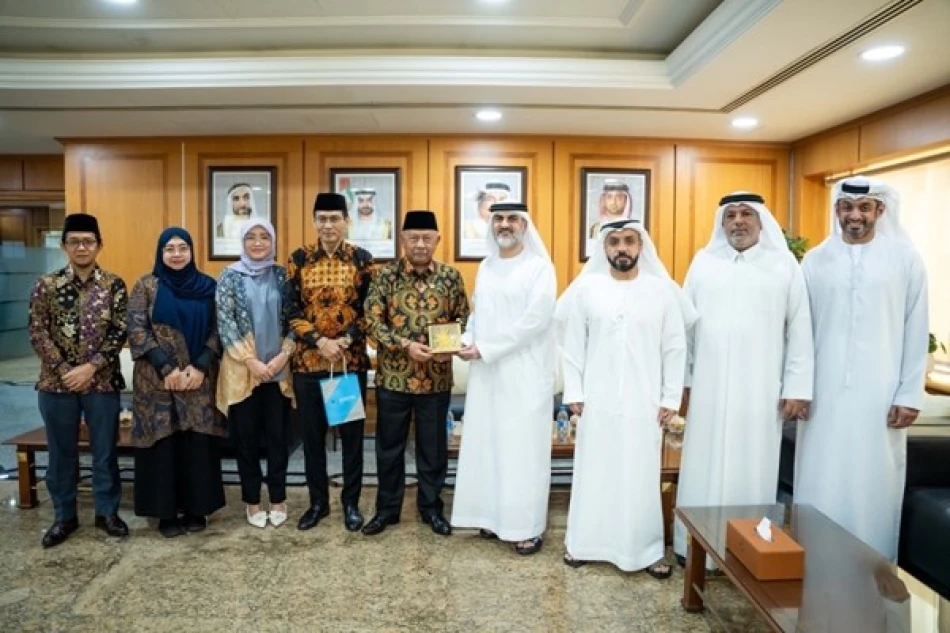
Ajman Chamber Explores Deepening Economic and Trade Ties with Indonesian Delegation
UAE-Indonesia Economic Partnership Gains Momentum as Ajman Chamber Deepens Trade Ties
The Ajman Chamber of Commerce is accelerating efforts to capitalize on the UAE-Indonesia Comprehensive Economic Partnership Agreement, hosting high-level discussions with Indonesian officials to unlock new investment opportunities and strengthen bilateral trade. The move signals the UAE's continued strategy to diversify its economic partnerships beyond traditional Western markets, particularly as Indonesia emerges as Southeast Asia's largest economy.
Strategic Meeting Highlights Investment Potential
During a meeting at the Ajman Chamber headquarters, officials from both sides explored concrete ways to enhance economic cooperation and develop cross-border investments. The Indonesian delegation, led by Ambassador Hussein Bajis, included key economic and trade officials, while the Ajman Chamber was represented by Director General Salem Al Suwaidi and senior department heads.
Al Suwaidi emphasized that the comprehensive economic partnership agreement between the two countries "opens new horizons for developing mutual trade and investments," creating pathways for business leaders and investors from both nations to support economic growth and expand cooperation in sectors of mutual interest.
Ajman's Vision 2030 and Economic Diversification
The chamber's initiative aligns with Ajman's Vision 2030, which aims to create a competitive business environment and investment climate that drives economic growth and develops the emirate's foreign trade. This approach mirrors broader UAE strategies seen in Dubai and Abu Dhabi, where economic diversification away from oil dependency has become a central policy objective.
Key Investment Opportunities Presented
The Ajman Chamber showcased several investment opportunities to the Indonesian delegation, including the "Thra" Entrepreneurship Center, which provides innovative services and a sustainable business environment for entrepreneurs and investors. The chamber also highlighted the Ajman International Education and Training Exhibition, extending invitations to Indonesian universities to participate in upcoming editions to enhance academic cooperation and expand scientific and cultural exchange.
Indonesia's Economic Appeal and Market Access
Ambassador Bajis outlined Indonesia's economic fundamentals and the promising investment opportunities available across various sectors in his country. He specifically invited the Ajman Chamber and its private sector members to participate in the 40th Indonesia Trade Expo 2025, scheduled for October 15-19, 2025.
This invitation is particularly significant given Indonesia's position as the world's fourth most populous country and its rapidly growing middle class, which presents substantial market opportunities for UAE businesses looking to expand their regional footprint.
Focus on Food and Beverage Sector Collaboration
The meeting emphasized the need to intensify cooperation in the food and beverage sector, recognizing the qualitative advantages both countries possess in this area. This focus makes strategic sense given the UAE's position as a regional food security hub and Indonesia's vast agricultural resources and food processing capabilities.
Information Exchange and Business Networking
Both sides agreed to enhance information sharing and organize bilateral forums to provide a framework for business owners and investors. These initiatives aim to support experience sharing and partnerships that will boost trade volume and drive joint investment activities.
This systematic approach to business networking reflects successful models implemented by other regional trade hubs like Singapore and Hong Kong, where government-facilitated business connections have proven instrumental in driving economic growth.
Implications for Regional Trade Dynamics
The strengthening UAE-Indonesia economic relationship represents a broader shift in global trade patterns, where Middle Eastern economies are increasingly looking toward Asia for growth opportunities. This partnership could serve as a model for other GCC countries seeking to diversify their economic relationships and reduce dependence on traditional Western markets.
For investors and businesses, the enhanced cooperation signals potential opportunities in sectors ranging from logistics and manufacturing to technology and renewable energy, particularly as both countries pursue ambitious economic diversification goals.
Most Viewed News

 Layla Al Mansoori
Layla Al Mansoori






